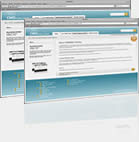APM I - Course Summary and Outline
The course is divided into two separate parts, each of which is intended to improve the capabilities of a Project Manager or a potential Project Manager. The first part describes the steps necessary to become a top quality PM. This part focuses on the background and education necessary to be considered for a project management role. Once an individual has been considered for this very important position, a PM should take advantage of training and experience opportunities that become available and must maintain a conscientious effort toward self-improvement. Other items in this first part concentrate on developing characteristics of leadership as well as motivational skills that will improve the PM’s efforts to ensure that your project team will work closely with you so that the project’s goals will be met.
The second part of this course deals with the actual fundamentals of managing a project so that a Project Manager and every team member are performing at an optimum level. This section of the course covers the multiple functions of the project, including the activities necessary to assure that engineering, equipment and construction meet the quality objectives of the project. In this portion of the course are many techniques which describe how to obtain optimum scope and design parameters as well as maintaining schedule and cost controls. Numerous examples are given of solutions to problems that are encountered as the project unfolds. The PM is made aware of the subtleties that are available to resolve seemingly difficult issues.
Below is an outline of the topics explored and areas of instruction included in Advanced Project Management.
A. Qualifications for a Project Manager
1. Background/Education
2. Experience/Training
3. Leadership Qualities
a. Direct Company Representative
b. Non-Company Representative
4. Motivational Skills
a. Maintain Unity
b. Maintain Integrity
c. Strive for Excellence
B. Direct Project Responsibilities and Functions
1. Scope of Work
a. Understanding Client Requirements and Goals
b. Assignments and Communications
c. Communicating with Executive Management
d. Preparing Executive Summaries
2. Developing a Budget
3. Scheduling - Understanding Time vs. Costs
4. Engineering and Design
5. Procurement
6. Construction
7. Cost Control and Cost Correction
8. Startup
9. Closing - Achieving Success and Avoiding Failure

